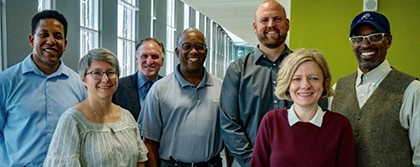September 17, 2018

A new video highlights how NIEHS grantees are raising awareness of the environmental health issues in Detroit. The video was created by the Community Engagement Core (CEC) within the Center for Urban Responses to Environmental Stressors (CURES) at Wayne State University. “Over the summer we had an intern who was passionate about film and ready for a challenge,” said Carrie Leach, CEC program manager who led the video project.
The video takes viewers on a tour of the city, presenting environmental issues affecting the health of Detroit residents, such as poor air quality due to high truck traffic, lead-contaminated soil and water, as well as abandoned homes and buildings that create an unsafe environment. “We provide guided tours similar to this video that immerse students in the environment,” said Leach. “It’s a powerful learning tool for making the connection between where you live and your health.”
Switching scenes, the video highlights how CURES is working to address environmental challenges through research. “Dr. Tracie Baker allowed us to film in the zebrafish lab where her team examines how chemical exposures affect health across generations,” said Leach. “The lab is an exciting way to visually represent science.” The video also highlights CURES engagement with partners, community residents, leaders, and decision makers who share their mission to raise awareness and solve environmental health challenges in Detroit.
“This video captures the heart and spirit of the CURES Center. CURES is all about listening to our community and translating environmental health research to knowledge, to awareness, and to action,” said Melissa Runge-Morris, M.D., CURES director. “Focused on the human health consequences of environmental exposures in an ever-changing urban landscape, CURES researchers and community partners are working together for a healthy Detroit – now and in the future.”


